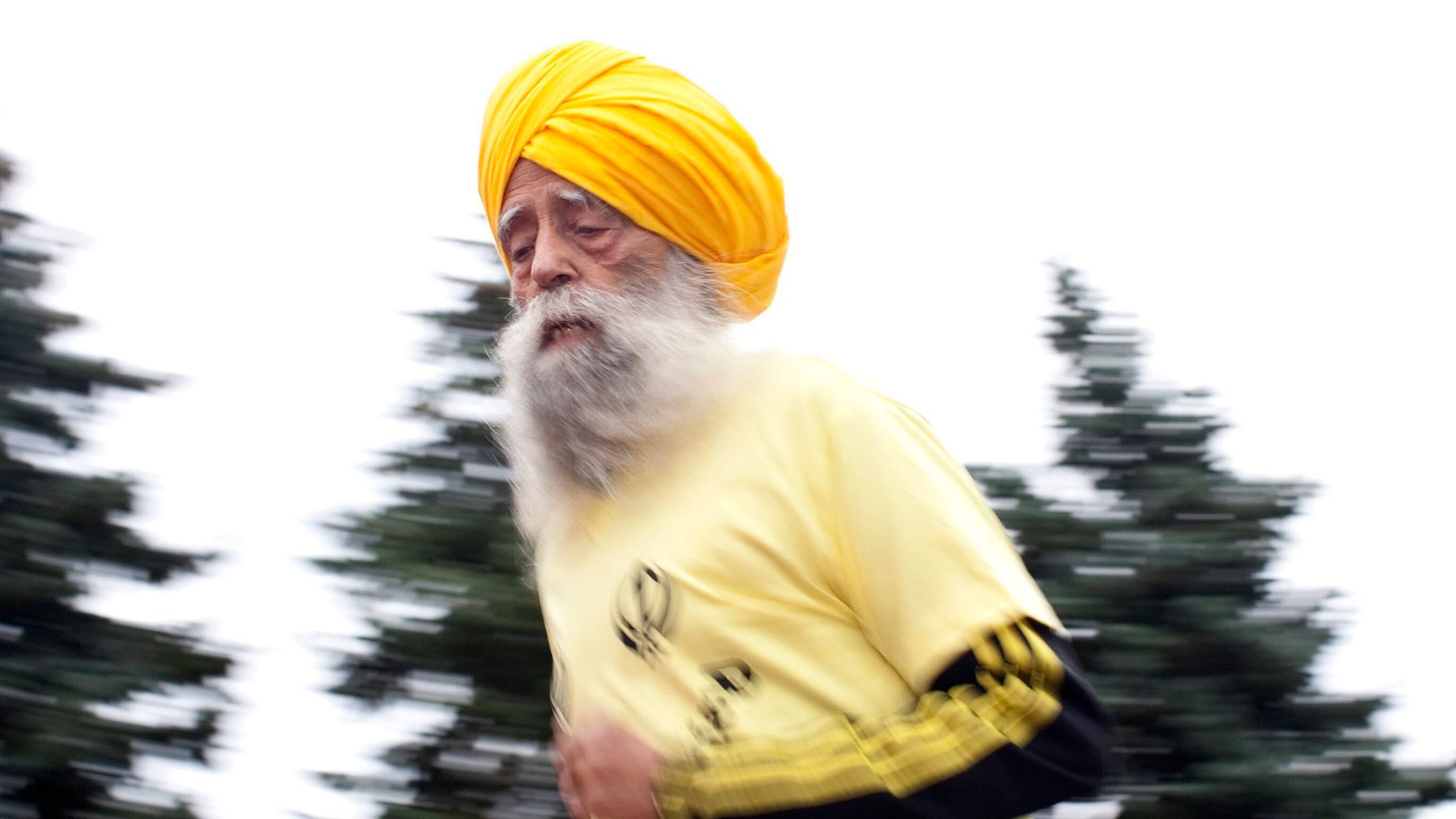Fauja Singh, the legendary British runner widely believed to be the oldest person to ever complete a marathon, has died at the age of 114 after being struck by a car in his birth village of Beas Pind, India. Singh suffered fatal injuries while crossing the road, according to reports confirmed by his London-based running club, Sikhs In The City.

What It Is
Fauja Singh became an international inspiration when he completed the London Marathon in 2000 at the age of 89, clocking a time of six hours and 54 minutes. Despite early childhood challenges he couldn’t walk until age five due to weak legs, he went on to run multiple marathons well past his 100th birthday. His personal best came in Toronto in 2003 at five hours and 40 minutes, and by 2011, he was believed to be the first centenarian to finish a full marathon. He officially retired from competitive running after serving as a torchbearer for the 2012 London Olympics.
So What? Insights
Fauja Singh wasn’t just a runner, he was a symbol of resilience, longevity, and unwavering positivity. In an era where age is often seen as a limitation, Singh’s story was a living rebuke. His disciplined lifestyle, humility, and spiritual practices turned him into a global icon, not just for Sikhs or runners, but for anyone chasing dreams later in life. His death, while tragic, reminds us how one individual can redefine the limits of human endurance and aging.
Quick link: Nurse On First Day Among Four Dead In Southend Plane Crash
Key Implications
-
A Void in Global Sports Inspiration: Fauja Singh’s passing marks the end of a remarkable chapter in athletics and public life.
-
Road Safety for Elderly Individuals: His death also highlights the need for improved pedestrian safety measures, particularly for seniors.
-
Cultural Legacy: Singh’s life and achievements will continue to be referenced in discussions around aging, health, and motivation.
-
Community Mourning: Tributes are pouring in from MPs, local leaders, and sports enthusiasts, celebrating a man who lived not just long, but meaningfully.
Practical Takeaways
-
Consider regular light exercise, meditation, and a healthy diet. Singh famously credited his longevity to ginger curries and spiritual focus.
-
Road safety education and improved infrastructure for the elderly must become a higher priority, even in rural communities.
-
Use Singh’s story in educational settings or motivational contexts to encourage perseverance at any age.
Final Thoughts
Fauja Singh was proof that the human spirit doesn’t age. He didn’t just run marathons—he ran circles around society’s expectations. From torchbearing at 101 to training into his centenarian years, Singh showed us that passion has no expiry date. He may have hung up his running shoes, but his legacy will keep running in hearts across the world.













**mindvault**
mindvault is a premium cognitive support formula created for adults 45+. It’s thoughtfully designed to help maintain clear thinking
**prostadine**
prostadine is a next-generation prostate support formula designed to help maintain, restore, and enhance optimal male prostate performance.
**sugarmute**
sugarmute is a science-guided nutritional supplement created to help maintain balanced blood sugar while supporting steady energy and mental clarity.
**glpro**
glpro is a natural dietary supplement designed to promote balanced blood sugar levels and curb sugar cravings.
**vitta burn**
vitta burn is a liquid dietary supplement formulated to support healthy weight reduction by increasing metabolic rate, reducing hunger, and promoting fat loss.
**mitolyn**
mitolyn a nature-inspired supplement crafted to elevate metabolic activity and support sustainable weight management.
**prodentim**
prodentim an advanced probiotic formulation designed to support exceptional oral hygiene while fortifying teeth and gums.
**synaptigen**
synaptigen is a next-generation brain support supplement that blends natural nootropics, adaptogens
**zencortex**
zencortex contains only the natural ingredients that are effective in supporting incredible hearing naturally.
**yusleep**
yusleep is a gentle, nano-enhanced nightly blend designed to help you drift off quickly, stay asleep longer, and wake feeling clear.
**nitric boost**
nitric boost is a dietary formula crafted to enhance vitality and promote overall well-being.
**glucore**
glucore is a nutritional supplement that is given to patients daily to assist in maintaining healthy blood sugar and metabolic rates.
**wildgut**
wildgutis a precision-crafted nutritional blend designed to nurture your dog’s digestive tract.
**breathe**
breathe is a plant-powered tincture crafted to promote lung performance and enhance your breathing quality.
**energeia**
energeia is the first and only recipe that targets the root cause of stubborn belly fat and Deadly visceral fat.
**boostaro**
boostaro is a specially crafted dietary supplement for men who want to elevate their overall health and vitality.
**pineal xt**
pinealxt is a revolutionary supplement that promotes proper pineal gland function and energy levels to support healthy body function.
**prostabliss**
prostabliss is a carefully developed dietary formula aimed at nurturing prostate vitality and improving urinary comfort.
**potentstream**
potentstream is engineered to promote prostate well-being by counteracting the residue that can build up from hard-water minerals within the urinary tract.
**hepato burn**
hepato burn is a premium nutritional formula designed to enhance liver function, boost metabolism, and support natural fat breakdown.
**hepato burn**
hepato burn is a potent, plant-based formula created to promote optimal liver performance and naturally stimulate fat-burning mechanisms.
**cellufend**
cellufend is a natural supplement developed to support balanced blood sugar levels through a blend of botanical extracts and essential nutrients.
**prodentim**
prodentim is a forward-thinking oral wellness blend crafted to nurture and maintain a balanced mouth microbiome.
**flow force max**
flow force max delivers a forward-thinking, plant-focused way to support prostate health—while also helping maintain everyday energy, libido, and overall vitality.
**revitag**
revitag is a daily skin-support formula created to promote a healthy complexion and visibly diminish the appearance of skin tags.
**neurogenica**
neurogenica is a dietary supplement formulated to support nerve health and ease discomfort associated with neuropathy.
**sleeplean**
sleeplean is a US-trusted, naturally focused nighttime support formula that helps your body burn fat while you rest.
**memory lift**
memory lift is an innovative dietary formula designed to naturally nurture brain wellness and sharpen cognitive performance.